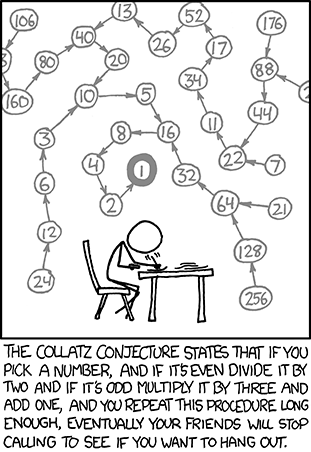Some days ago Glenn (from SensePost) talked to me about an interesting concept he has seen regarding convergence in Wikipedia. He wanted a way to visualize it and I gladly helped him with Maltego and some machines. It's his story to tell - so I wont.
Then - literally a day later I was reading XKCD and saw this:
I had the concept already in Maltego with machines (for Glenn's experiment) - I just needed the transform. I spoke to Glenn - he was up for hacking it together (I am lazy that way) and sure enough - 15 minutes later graphs were forming. The machine I used looked like this:
machine("axeaxe.Collatz",
displayName:"Collatz",
author:"RT",
description: "Just playing") {
onTimer(1) {
type("maltego.Phrase",scope:"global")
outgoing(0)
value("1",invert:true)
log(">",showEntities:true)
run("paterva.v2.Collatz")
}
}
The tranform was really simple - if the number (X) was even it would return (X/2), if it was odd it would return (3X+1). The machine simply looks for all phrases (we used phrases as numbers) that did not have a child and was not equal to '1' and ran the transform on all of those - every second.
The graphs are pretty nice (click on them for a larger version). I used 500 random numbers between 1 and 10 000. There's a total amount of 6085 nodes on the graph - and it's still pretty responsive. The graphs show how they all coverge on '1' - I used different layouts etc. All in all it was a fun project - and it helped us to iron out some bugs in Maltego Radium machines.
The Collatz conjecture can be found [here on Wikipedia]. It's also called 'hailstone' sequences (they fall & rise silly - that's why).
Enjoy the pretty pictures!
RT
Then - literally a day later I was reading XKCD and saw this:
I had the concept already in Maltego with machines (for Glenn's experiment) - I just needed the transform. I spoke to Glenn - he was up for hacking it together (I am lazy that way) and sure enough - 15 minutes later graphs were forming. The machine I used looked like this:
machine("axeaxe.Collatz",
displayName:"Collatz",
author:"RT",
description: "Just playing") {
onTimer(1) {
type("maltego.Phrase",scope:"global")
outgoing(0)
value("1",invert:true)
log(">",showEntities:true)
run("paterva.v2.Collatz")
}
}
The tranform was really simple - if the number (X) was even it would return (X/2), if it was odd it would return (3X+1). The machine simply looks for all phrases (we used phrases as numbers) that did not have a child and was not equal to '1' and ran the transform on all of those - every second.
The graphs are pretty nice (click on them for a larger version). I used 500 random numbers between 1 and 10 000. There's a total amount of 6085 nodes on the graph - and it's still pretty responsive. The graphs show how they all coverge on '1' - I used different layouts etc. All in all it was a fun project - and it helped us to iron out some bugs in Maltego Radium machines.
The Collatz conjecture can be found [here on Wikipedia]. It's also called 'hailstone' sequences (they fall & rise silly - that's why).
Enjoy the pretty pictures!
RT




